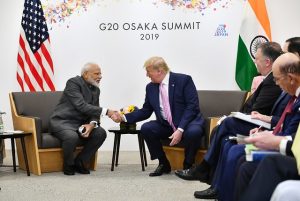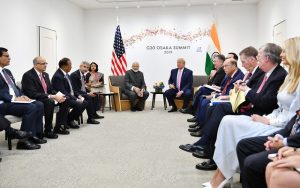
OSAKA: Amid differing perceptions over a host of economic and geopolitical issues, India’s Prime Minister Narendra Modi and US President Donald Trump agreed to resolve trade irritants and converged on handling the Iranian issue for the sake of peace and stability in the region.
The leaders of the world’s two largest democracies met on the sidelines of the G20 summit in Osaka and discussed trade-related frictions, defence relations, the Iranian crisis and prospects of cooperation of 5G under the Make in India programme.
This was Mr Modi’s first meeting with Mr Trump in his second term, with the latter lavishly praising the Indian leader on his impressive electoral victory in the May elections.
Changing the narrative
The overarching thrust of the Modi-Trump meeting was on resetting India-US ties and changing the narrative of this crucial partnership that has lately become entangled in the thicket of contentious issues and clashing expectations.
The two leaders shook hands warmly and smiled as they sat down with their delegations to map the way ahead for what Trump’s predecessor Barack Obama had famously described as “the defining partnership of the 21st century.” The maverick US president, who has made a signature style of his unpredictability, struck an upbeat note, saying that the India-US ties had never been closer, setting the right tone for a wide-ranging interaction that was described as “open, productive and warm” by Indian officials.
Trade frictions

Although the incipient tariff war has dominated the headlines recently, the two leaders focused on the way ahead, rather than letting the situation exacerbate. Taking a forward-looking view, Mr Modi referred to the withdrawal of special export privileges accorded by the US to India and the retaliatory step taken by India to impose duties on 28 items the US exported to India as “something that had already happened and that we should now look forward and see how we can resolve some of the issues”. The two leaders decided that a meeting at the level of trade or commerce ministers will be held soon to resolve trade-related irritants.
“President Trump welcomed this idea…so we expect now an early meeting – the level will be decided late,” said Mr Gokhale.
Iran: Promoting stability in West Asia

It’s not clear if the US side agreed to accommodate India’s request for extending a waiver for limited imports of Iranian oil, but there was a larger discussion on Iran in the context of peace and security in the region. On Iran, the two sides agreed to remain in touch to ensure that the situation in the region remained stable, said Mr Gokhale said.
Given the dangerous consequences of escalation of the US-Iran confrontationist posturing, Mr Modi outlined the critical importance of the Middle East for India. Outlining the importance of Iran for India’s energy security, Mr Modi said that Iran supplied 11% of India’s energy needs. He also conveyed to Mr Trump that India had reduced oil imports from the West-Asian country even as it hurt the Indian economy.
Alluding to around 9 million Indians who live in West Asia, Mr Modi conveyed that there were economic interests as well, and “therefore it’s in India’s fundamental interests to have peace and stability in the region,” according to Mr Gokhale.
The prime minister also added that India had dispatched two of its naval ships to the region for the protection of Indian flagged vessels passing through the Strait of Hormuz, which was appreciated by President Trump. On the issue of stability in West Asia, there was a striking convergence. Mr Trump voiced hope that oil prices would remain stable and stressed that the US was doing its best to ensure that stability was maintained.
Going by the tone and tenor of the first Modi-Trump meeting in months, and the read-out by both sides, the big message that emanated from Osaka was that although contentious issues will not vanish anytime soon, India and the US will focus on restoring momentum in bilateral ties by focusing on shared strategic and economic interests.

(Manish Chand is CEO & Editor-in-Chief, India Writes Network and India and the World magazine.
He is in Osaka, Japan, to report on and analyse India’s Prime Minister Narendra Modi’s visit for the G20 summit of the world’s leading economies. Follow him on twitter@ scepticcryptic)
Author Profile

- Manish Chand is Founder and Editor-in-Chief of India Writes Network (www.indiawrites.org) and India and World, a pioneering magazine focused on international affairs. He is CEO, Centre for Global India Insights, an India-based think tank focused on global affairs.
Latest entries
 India and the WorldFebruary 27, 2026Modi visit: India-Israel partnership enters a new era
India and the WorldFebruary 27, 2026Modi visit: India-Israel partnership enters a new era India and the WorldFebruary 24, 2026Unravelling Modi’s Israel journey: What to expect
India and the WorldFebruary 24, 2026Unravelling Modi’s Israel journey: What to expect India and the WorldFebruary 17, 2026South-by-South: Focus on people-centric solutions at India AI summit
India and the WorldFebruary 17, 2026South-by-South: Focus on people-centric solutions at India AI summit India and the WorldFebruary 7, 2026Modi hails interim India-US trade deal, Goyal says no concessions made on agriculture
India and the WorldFebruary 7, 2026Modi hails interim India-US trade deal, Goyal says no concessions made on agriculture







